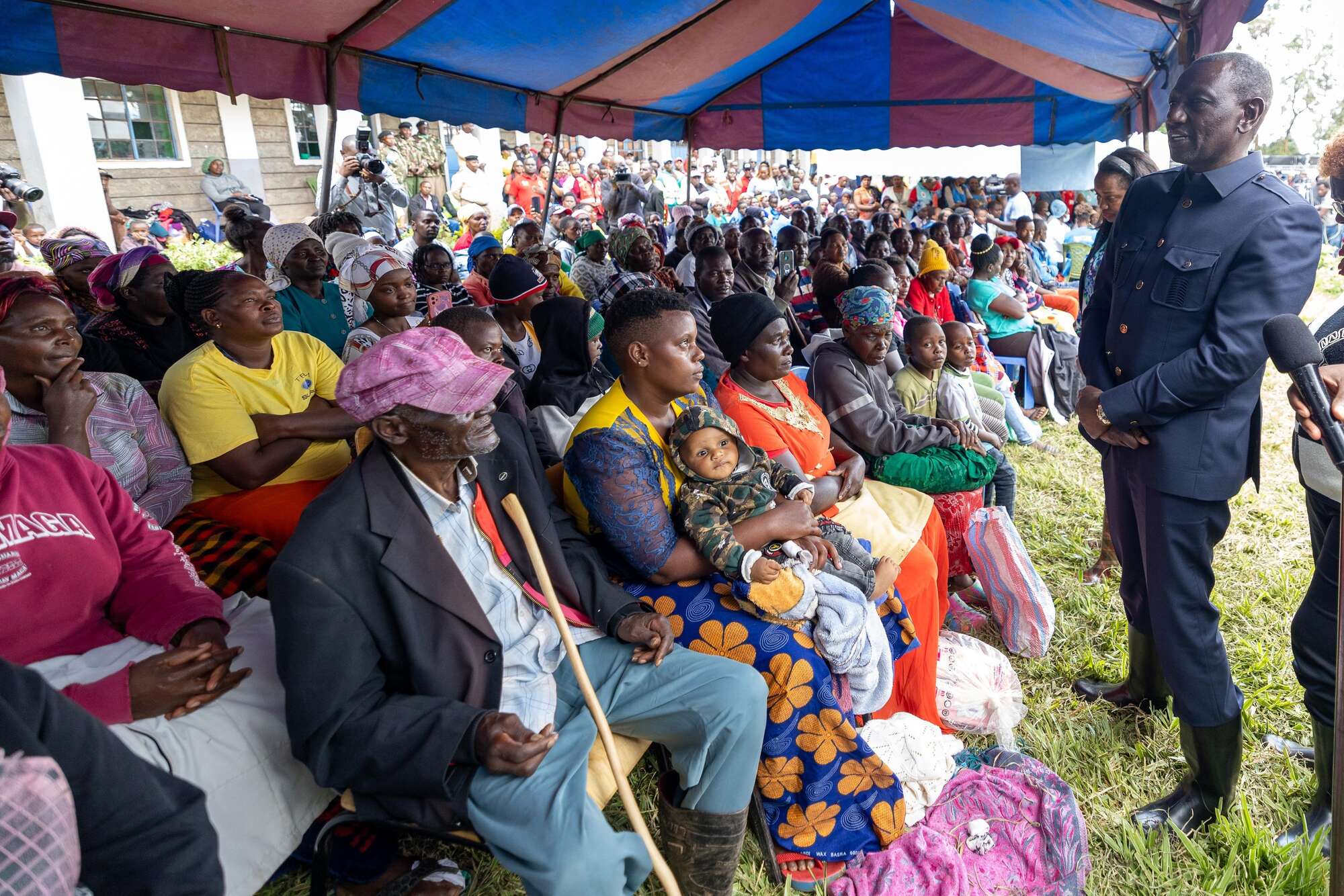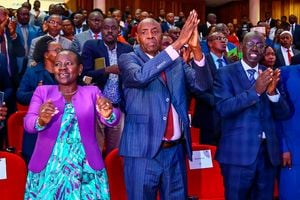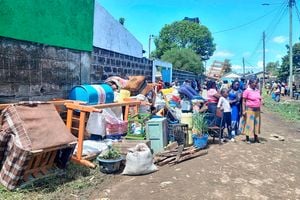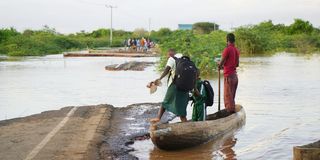
Students disembark from a canoe to school at Watta Hamesa village, Tana River County on May 13.
One month since schools reopened for the second term, some learning institutions remain closed, and thousands of learners have not resumed classes in the aftermath of the heavy rains and floods that hit many parts of the country.
A spot check by Nation.Africa has also established that infrastructure destroyed by floods in public schools has not been rebuilt as the government has yet to disburse capitation funds to the schools.
In some schools, a health crisis looms because of inadequate or unsuitable sanitation facilities. In cases where families were displaced, the children might stay longer out of school.
Education Cabinet Secretary Ezekiel Machogu said that the government expects Members of Parliament to utilise the emergency allocation of the National Government Constituency Development Fund to rebuild infrastructure in schools. He said the constituency offices received Sh18 Million each a week ago.
Although the rains have subsided in many counties, the forecast for June by the Meteorological Department shows that counties in the North Rift, Western Kenya and Nyanza will receive above-average rainfall.
“There is a possibility of flooding in low-lying areas, flood plains, and along rivers, especially over the Lake Victoria Basin where above-average rainfall is expected. Relevant authorities are therefore advised to implement measures to mitigate possible negative impacts that may arise,” the forecast reads.
Still closed
At least five schools in Kisumu County remain closed due to flooding.
Odienya, Oseth, Nyamrundu, Kibarwa, and Kandaria primary schools are inaccessible, and the learners have since transferred to Ugwe and Nduru primary schools within the sub-county.
However, the head teacher of Nduru Primary School, George Aringo, said that hundreds of learners are yet to report back to school. The school is hosting over 1,800 learners from three schools still submerged in Nyando sub-County.
"Oseth Primary School is topping the list with 94 learners yet to report back to school followed by Odienya at 64," said Mr Aringo.
The school head said that 55 learners from Nyamrundu and seven from Nduru primary are yet to return to class.
While some learners are suspected to have relocated from the flood-prone area in May, others remain out of school due to long distances from the learning institutions.
"We were directed by the county government to host the three schools to ensure learning activities continue despite the disruption," said Mr Aringo.
'Risky state'
Classrooms at Sintaan Primary School in Baringo South sub-County have deep fissures on the floors and cracks in the walls. According to the head teacher, Stephen Olempakany, the cracks started in 2020 after heavy rainfall.
"The classrooms are a risk to the learners because they may collapse at any time. We tried to renovate two classrooms in the past but the cracks have widened," said Mr Olempakany.
Other schools affected are Leswa and Longewan primary schools after rivers Perkerra and Molo broke their banks.
Baringo South sub-County Director of Education George Okeyo said that there had been an earlier proposal to relocate the schools, but the plan flopped because the proposed site was four kilometres away from the village.
"The classrooms have not been re-constructed because we have not received any funding for the project yet, but the area MP Charles Kamuren has promised to allocate Sh500,000,” said Mr Okeyo.
“We have relocated one of the worst affected classes to learn under a tree as we wait for some tents from the Kenya Red Cross as a short-term measure,” he added.
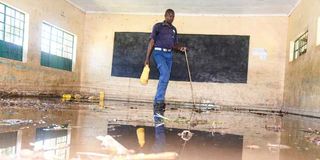
A security guard wades through a flooded classroom at Muslim Primary School.
He, however, said that most of the learners displaced by flooding have returned to their respective schools after the flood waters receded.
“The few whose houses were marooned and were camping in temporary camps in Logumgum village are learning at Logumgum Primary School,” said the sub-county director of education.
Schools Relocation
In Kilifi County, six public primary and secondary schools will be relocated to higher grounds in Malindi and Magarini sub-Counties.
Kilifi County Commissioner Josephat Biwott said the government is working on a permanent solution for perennial floods.
“All the schools that were affected by floods are on. There is no need for us to renovate the schools. We are relocating all those schools permanently including all the residents along River Sabaki,” he said.
Also Read: Azimio accuses government of neglecting Kenyans as floods displace families, destroy crops
The county commissioner said three secondary and three primary schools will be relocated.
Mr Biwott, also the Kilifi County Security Committee chairperson, said the government has embarked on a process to collect data for the affected households and map where to settle them.
In Tana River County, schools in Galole Constituency are most affected.
Makere Primary School was swept by raging waters from River Tana, whereas Nyangwani Primary School remains submerged. Others are Ndura and Hola TownShip primary schools, which are still flooded.
According to the Ministry of Education, six schools are yet to reopen due to floods. They are either submerged or inaccessible.
“Teachers cannot access it unless by boat or a big canoe,” reads the report by Feiswal Obo, the Tana Delta sub-county director of education.
Chepkalit Secondary School in Pokot South Sub-county, West Pokot County, was reopened three weeks ago after the rains subsided, but its damaged infrastructure has not been repaired.
West Pokot County Director of Education Simon Wamae said measures are in place to repair schools affected by floods in the county. Kodera Primary School in Kacheliba Sub-County is partially open. Mr Wamae said learners from one side of the schools have to go to other schools.
“The school is like an island and a population from one side is not able to go to school because the bridge was swept away. Some pupils went to Konyao Primary School," he said.
Submerged
Meanwhile, two schools were submerged by the rising waters of Lake Turkana, while latrines in four other schools in the county were destroyed.
The water in the lake, which has River Omo from Ethiopia as its main tributary, had been rising even before additional waters from the recent heavy rains that flooded the Turkwel and Kerio rivers and the seasonal Kawalase River. This left Katula and Merier primary schools in Turkana Central Constituency submerged.
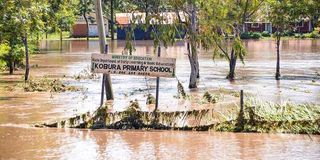
Submerged Kobura Primary School in Ahero town, Nyando Constituency.The heavy downpour in Ahero has affected many learning instutions in the region.
Area Member of Parliament Emathe Namuar said the children moved with their parents to higher grounds.
"St Mary’s, Canaan, Kalimapus and Kerio primary schools had their school latrines destroyed by the heavy rains. Even though learning is going on, there is an urgent need for construction of new latrines," Mr Namuar said.
He called on the government to rehabilitate the facilities and allocate funds to construct new latrines. Turkana County Commissioner Julius Kavita directed education officials to ensure that children from displaced families are enrolled in nearby schools.
"We are first ensuring that children from schools submerged by the rising waters of Lake Turkana are accommodated by other schools until when the waters subside to be allowed to go back," Mr Kavita said.
In Bomet County, the institutions affected include Kipricheit, Kipkoligo and Itembe.
Reporting by David Muchunguh, Florah Koech, Winnie Atieno, Maureen Ongalo, Steve Oduor, Oscar Kakai and Sammy Lutta

